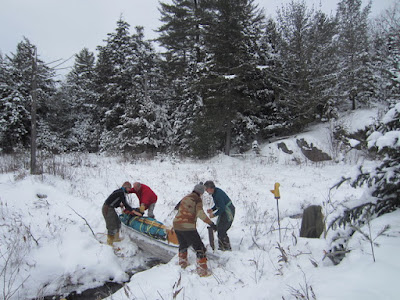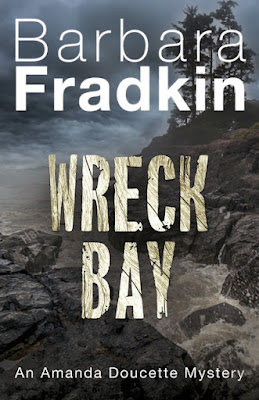Today I'm delighted to welcome Barbara Fradkin as guest blogger to Murder Is Everywhere. Barbara is a retired child psychologist with a fascination for why we turn bad. She's been writing since she was a child, but didn’t get serious until she discovered crime fiction. In the past two decades or so, she has published at least thirty short stories and fifteen novels, as well as four Rapid Reads short novels. Many of her works have been shortlisted or won Awards of Excellence from Crime Writers of Canada.
She's probably
best known for her gritty, psychological detective series featuring quixotic,
exasperating Ottawa Police Inspector Michael Green. Her more recent Amanda
Doucette series features a foreign aid worker who battles her own traumatic
past to help people in trouble. The fifth in that series, WRECK BAY, has
just been released. More info at https://www.barbarafradkin.com.
Over to you, Barbara.
Thanks, Michael, I’m delighted to be
invited. Since the fifth book in my Amanda Doucette series was just released
this week, the timing is perfect, and Murder is Everywhere is an apt
description of the series itself.
 |
| Newfoundland |
She sets up a cross-country series of adventure tours for charity, which gives me the freedom to move her from place to place. For each book, I chose a unique, iconic location that showcased the diversity of the country and its people. I started as far east as I could get, setting the first book on the Great Northern Peninsula of Newfoundland. In FIRE IN THE STARS, which introduces her and sets up the premise of the series, her desperate search for a fellow aid worker tormented by the same trauma leads her deep into the world of tiny outports, rugged seas, and untouched inland forests. All the while dealing with some nasty people smugglers.
 |
| Winter camping |
The second book, THE TRICKSTER’S LULLABY, takes place in the dead of winter in Quebec’s Laurentian Mountains, part of the ancient Canadian shield, where Amanda braves dangerous blizzards to search for two missing teenage campers under the threat of homegrown Islamic radicalisation. The third, PRISONERS OF HOPE, is set in Georgian Bay, part of the Great lakes and home to over 30,000 islands. As the largest freshwater archipelago in the world, it’s an outdoor paradise of sparkling inlets, pink granite shores, and ferocious storms. In the fourth book, THE ANCIENT DEAD, I leave the lush world of central Canada for the stunning moonscape of Alberta’s badlands, where sun, heat, dust, and drought can be deadly and where dinosaur bones are not the only bones buried beneath the barren, windswept plains.
This most recent book, WRECK BAY, completes Amanda’s trek from east to west. After starting on Canada’s most eastern island, I end up on the Pacific shore of Vancouver Island, where bears and cougars prowl amid the towering firs and cedars, and whales and dolphins frolic in the ocean swells. In each region, I learned how the land shaped the people, from the generations of fishers in the close-knit villages of Newfoundland to the proud individualism of the prairies to the adventure-seekers and aging hippies who embraced the unspoiled beauty of the Pacific Rim and the First Nations who have tended it for 10,000 years.
 |
| Alberta |
Writing these books has been a voyage of discovery for me too. Each book began with research, research and more research. I want a real feel for each place, and not just the geography but the history, culture, and people. I amass books from stores and libraries, comb the internet for details, and mine friends and contacts for information. From this initial research, the germ of an idea takes shape, like the grain of sand in the oyster. While reading for WRECK BAY, for example, I learned about the Vietnam war resisters who flooded Vancouver Island and the hippie communes that sprang up on the west coast over fifty years ago. I discovered one commune had been tucked into a small beach called Wreck Bay. And from those two ideas, the kernel of my story took shape.
But reading is never enough to get the feel of a place. I believe you don’t really get that until you visit it, experience its sights, sounds and smells, discover the little details that make it unique and bring it to life on the page. The more vivid the detail, the more the reader feels part of the adventure. With each book, I took at least one trip to the area, usually more than one. I stay in local places and explore. I try to walk in Amanda’s shoes. This is not just passive observation but active engagement. I hiked the coastal cliffs and stubby boreal forests of Newfoundland, I went snowshoeing and winter camping in Quebec (in a tent – there’s dedication to my craft!), I kayaked and hiked in Georgian Bay, and went dinosaur prospecting and trail riding in Alberta. On Vancouver Island I went kayaking, hiking, whale and bear watching, and walked along to beaches with the powerful surf swirling around my feet. I even tracked down the location of the Wreck Bay commune, long since reclaimed by nature.
 |
In these books, setting is not a mere backdrop but a character. It drives the story and interacts with the characters. I hope the reader feels caught up in the place just as the characters are, and that in the end, I have taken them on a new and exciting journey that’s as much fun for them as it was for me.


















Lovely Blog. I did some trekking in the Rockies. Canada is very big indeed! Like most Scots, many of my family escaped to Canada. My aunt's brother was a social worker in one of the jails in Alberta ( he was the intelligent one). Another relative was a lion tamer in a circus, and was killed by one of his own lions ( he was the less intelligent one).
ReplyDeleteBeing killed by a lion in Canada is unusual! That's more an African problem.
DeleteYikes, Carol, that sounds grisly. Being killed by a mountain lion, AKA cougar, is not as unusual but still rare.
DeleteSounds, grisly? Oy.
DeleteYou extensive research comes through loud and clear. I must get Wreck Bay, because I knew resisters who headed that way and often wondered what happened to them.
ReplyDelete